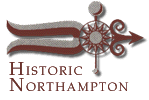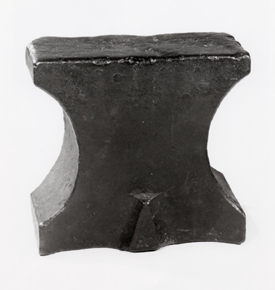
Archives & Manuscripts Costumes & Textiles Daguerreotypes & Photographs Decorative Arts Fine Art Other Collections Furniture Digital Collections 
|


The Pomeroy Anvil
“…to supply the Townes need of Smithery…”
 |
The Pomeroy Anvil |
This cast iron anvil was used by several generations of blacksmiths in the Pomeroy family of Northampton, Massachusetts. The anvil is believed to have been granted to Medad Pomeroy (1638-1716) by the town of Northampton beginning in 1660.
Medad Pomeroy left Windsor, Connecticut at age 21 for Northampton, apparently already trained as a blacksmith. In 1660, the town of Northampton sold to Medad Pomeroy "on Termes" the tools of John Webb, a settler of Northampton circa 1654 who is listed in town records as a "brazier". The tools were described as "a paire of bellowes an anvill a hand hammr on hammer 3 pr of Tongs a Bickorne a slice a naileing stake two cheesels one nayling hammer." Five years later, the tools were given to Medad unconditionally. In 1661, the town made grants of land to Medad on the condition that he "supply the Townes need of Smithery":
"At a Legall Towne meeting 8 2: mo. 1661 (8th of April) It was then voted and Granted to Medad Pumry and Jonathan Hunt that they should either of them haue 16 Acres of land either of them 8 Acres within the fence feild and either of 8 Acres by the mill River,...and that it is granted to them on this Condition that they shall inhabit in this towne and possess it in ther owne psons fowre yeares from the day of the date abouesaid, and doe the worke that belong to ther trades, that is to say to supply the Townes need of Smithery and Coopery ware." (James Russell Trumbull, History of Northampton, 1898, pp. 103-104)
According to New England Begins: The Seventeenth Century, volume 2, catalog entry 382, the very rough surface of the back side of the anvil suggests that the anvil was made in the American colonies rather than in England. The high heat necessary to bring low-carbon cast iron to the melting point had apparently just barely been reached when the molten iron was poured into an open top mold.
The anvil was donated to the Northampton Historical Society in 1953 by a Pomeroy family member. Blacksmiths and gunsmiths in the Pomeroy family include Medad Pomeroy (1638-1716), his son Ebenezer Pomeroy (1669-1754), his son Seth Pomeroy (1706-1777) and his son Quartus Pomeroy (1735-1803). The museum’s collection includes account books relating to Quartus Pomeroy, dating to 1773-1790 and 1795-1801 and a day book, 1788-1794, possibly belonging to Quartus Pomeroy. In addition, Historic Northampton’s collection includes three items made by Seth Pomeroy: a bear trap made circa 1735-1755, a musket dating to 1749 and a cow bell.
Medad Pomeroy is buried in Northampton’s Bridge Street Cemetery. While the original anvil resides in storage, a replica of the Pomeroy Anvil is on display at Historic Northampton, courtesy of Bill Pomeroy, creator of the Pomeroy Anvil Trail. The Pomeroy Anvil Trail features monuments in the shape of the anvil at locations across America historic to the Pomeroy family. Northampton’s monument on the Pomeroy Anvil Trail stands outside the cemetery facing Bridge Street and commemorates Medad Pomeroy, Seth Pomeroy and his brother, Lt. Daniel Pomeroy.
Contents Copyright 2025. Historic Northampton.